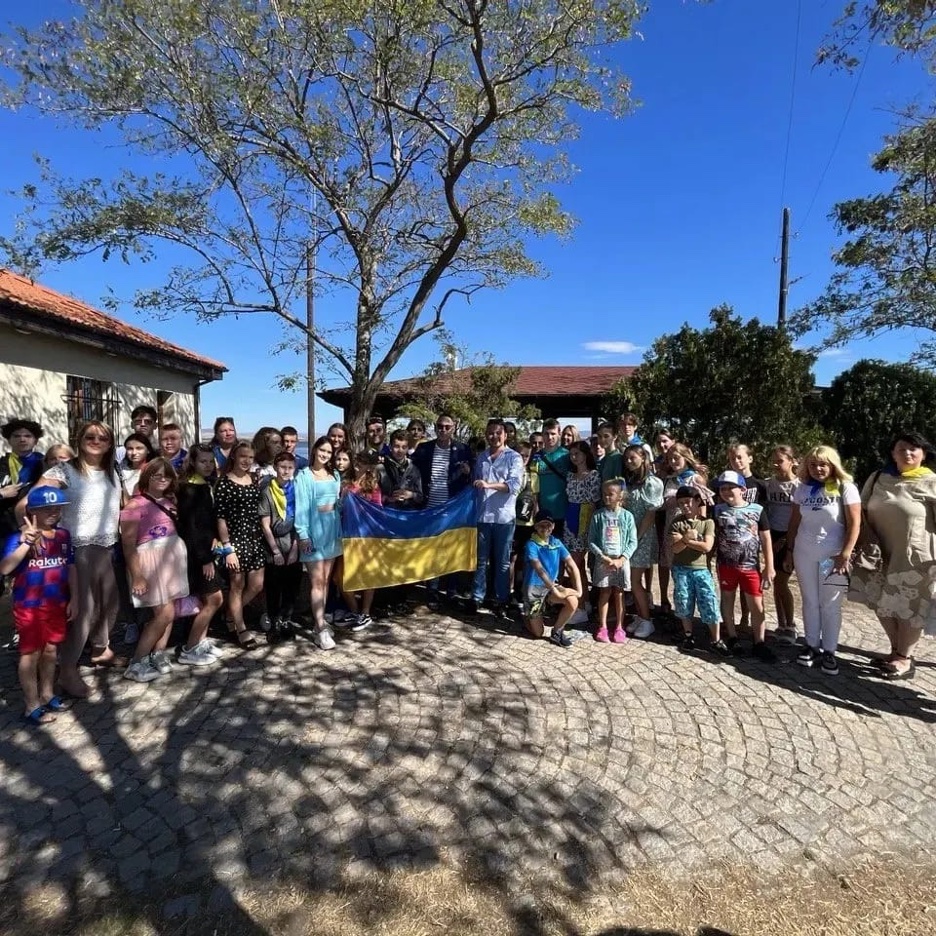Alex Luna on EU politics and War in Ukraine
 An interview with Olexander Tishchenko (Alex Luna) about EU politics, Russian invasion of Ukraine, and the Balkan elections of Boyko Borissov, a Bulgarian politician and Chairman of the GERB political party. Olexander Tishchenko is a Ukrainian opera singer and is better known both in Ukraine and abroad under the stage name Alex Luna. For seven…
An interview with Olexander Tishchenko (Alex Luna) about EU politics, Russian invasion of Ukraine, and the Balkan elections of Boyko Borissov, a Bulgarian politician and Chairman of the GERB political party. Olexander Tishchenko is a Ukrainian opera singer and is better known both in Ukraine and abroad under the stage name Alex Luna. For seven…

An interview with Olexander Tishchenko (Alex Luna) about EU politics, Russian invasion of Ukraine, and the Balkan elections of Boyko Borissov, a Bulgarian politician and Chairman of the GERB political party.
Olexander Tishchenko is a Ukrainian opera singer and is better known both in Ukraine and abroad under the stage name Alex Luna. For seven months in a row the Ukrainian people courageously and selflessly defended their land. Ukrainians defended their right to live in an independent, free, and prosperous European country – and sacrificed a lot for this… Today, Olexander Tishchenko is actively engaged in public and charitable activities in Ukraine and abroad.
Olexander, Alex, today we won’t talk about music or your creativity (sadly …), but we will talk about the burning topic that is the war in Ukraine. I know that you are no stranger to this topic. You are also doing your best to help your compatriots as much as possible. You are the co-founder of the charity foundation “Osnovi Krainy”. Please tell us more about the activities of your organization. How did the idea of creating this project began? What motivated you?
I will tell you about the history of the creation of our foundation. On February 24, with the beginning of Russia’s military actions against Ukraine, my friends, colleagues, and I found ourselves in the Makarovsky district (near Kiev), where we were under fire for about two weeks. After that, we moved to western Ukraine – to Ivano-Frankivsk. I also had the opportunity to be, at least minimally useful in the Clean Heart Foundation of Vasily Mikhailovich Vyshanyuk. This is a huge fund that helps all regions of the country without exception. The assistance of this fund is priceless to the victims of this war.
My main task was not to coordinate the activities of this organization, but to load the trucks that brought supplies to where they were needed. This experience gave me an opportunity to understand how charitable foundations work from the inside. I think that this job as a truck loader for “Clean Heart” actually inspired me to make a difference of my own. While I was loading trucks, I met one of the founders of our foundation – Lyudmila Gvozd. We had an idea. We’d been thinking for a very long time about how exactly we could help, and then realized that we primarily wanted to help children affected by this war and to provide psychological assistance to victims. Using my contacts, I managed to implement our first big project – to take 50 Ukrainian children on vacation to Sunny Beach, a wonderful four-star all-inclusive hotel in Bulgaria. The children were delighted.
According to the calculations of the Ministry of Health of Ukraine, at least 60% of Ukrainians currently need psychological help. Ukraine is also launching a National program of psychological Health and psychosocial support. It is obvious that there is now a huge shortage of psychological assistance centers in many regions of Ukraine. Alex, please tell me if your foundation plans to be involved and actively engage in this kind of activity? What resources are needed for this?
First, I want to say that, the number of people who need psychological help in our contry is far higher than 60%, it probably includes every citizen of my country. Recently, I attended the presentation of a very good project in the city of Bucha – in the Center for Psychological Assistance and Rehabilitation, which will function on a municipal basis. They help different segments of the population – children and their parents who survived the bombing, as well as military personnel who were on the front lines. The most important thing is that the mayor of the city took all this under his leadership. Together with foreign funds, they are engaged in this great cause. My colleagues and I really liked this idea and now we have plans to set up the same kind of Center in the city of Chernihiv, since this is my hometown and my native region. Our region needs help because the scale of destruction in the Chernihiv region is enormous.
We will be engaged in attracting financing from European funds and I am sure that in the foreseeable future a municipal center will appear in Chernihiv. It will provide completely free psychological assistance to all those who need it.
Today, a number of public Ukrainian/foreign organizations and foundations provide recreational short-term trips for Ukrainian children to many European countries. This is a great opportunity for our children to escape from the horrors of war. Olexander, as it has already become known, your charity foundation “Osnovi Krainy” is also engaged in psychological rehabilitation of children from Ukraine. The recent trip of the 50 Ukrainian kids organized by you personally for rest and psychological recovery in sunny Bulgaria has become an unforgettable event for every child.

When I organized the foundation, I, like any person, started by thinking where and how I could be most useful. Naturally, I thought about where I have the best contacts. I contacted the deputy of the People’s Assembly of Bulgaria, Lyuben Dilov Jr., and offered him this idea. And, probably, within an hour I received a positive response. He contacted me with another deputy, George Georgiev (to whom go out many thanks as well).
And as far as I know, in the very first hours of our communication our idea received the support of the head of the GERB party – ex-Prime Minister Boyko Borissov, who I hope will head and form a Bulgarian government Cabinet again after the elections on October 2. The party paid for the whole trip. I really liked the entire situation in that the hotel was specially chosen for children’s needs, which has incredible activities and its own wonderful water park. It really is the best place for kids to recuperate. The politicians approached the project with great responsibility and careful thought about our plans for the trip. We met with Mer and went on tours… we also met with Mr. Borissov, who was sincerely glad that he was able to help the with the children’s rest. We agreed that this should be an annual event.
Alex, today we will not discuss the complicated geopolitical situation in the Balkans, but I still would like to touch on a very important topic. Since you are a frequent visitor to Bulgaria and have long been familiar with many influential politicians and figures in this country, how would you describe the mood in the Bulgarian establishment? How open and sincere are they [politicians] in their support for Ukraine? It’s no secret that Bulgaria is a fairly pro-Russian country. Are you planning trips to other European countries?

We’re working on that right now. We have plans for a Christmas tour of the capitals of Europe. But the biggest project we want to implement is a winter trip of our children to Lapland, to Santa’s home. I think our European partners will help us realize this childhood dream of all children. I think our Ukrainian partners will also help us, because on my previous trip I was extremely surprised that there was not a single structure, organization, or government agency that would not meet us halfway. We heard “yes” in absolutely every place we applied to.
Therefore, I would like to take this opportunity to thank the head of the Chernivtsi Regional Military Administration, Mr. Ruslan Zaparanyuk, and Andrei Shents, head of the Youth and Sports Department of the Chernihiv Regional State Administration, and Ulyana Tkachenko, head of the Khmelnytskyi Regional Administration faction. And of course, special thanks to People’s Deputy Tatiana Tsyba, who supports almost all of my initiatives. When she heard that this was to help and rehabilitate children, she used all her resources, all her connections, and all her knowledge, to help organize our projects.
I am sure that this winter our children will visit not only Lapland, but also several European capitals.
As you know, Bulgaria will hold early parliamentary elections on October 2nd. Is it really a pro-Russian country?
Yes, you said it correctly – it really is pro-Russian, and it has a lot to do with the former Soviet Union. As for sincerity, it seems to me that this word should not be used next to the word politics. However, I have no reason to disbelieve the words of the people I met. I know that Mr. Boyko Borissov was one of the first to condemn Russian aggression and his party was one of the first to call for military actions on the territory of Ukraine an act of aggression, but also label Putin himself a terrorist. They were among the first to initiate concrete steps to provide not just technical and medical assistance, but also military assistance, including.
We have been talking about the events in Ukraine for quite a long time. And I repeat once again, I have every reason to trust these people and their intentions. As far as I understand, early parliamentary elections will be held in Bulgaria on October 2nd. And according to all exit polls, Boyko Borissov and his GERB party are at the head of this election race.
It seems to me that this will be the most pro-Ukrainian government in the last few years. It’s no secret that there is a protracted political crisis in Bulgaria right now. This is the fourth election in the last two years. I really want these elections to end this cycle of incessant political struggle so that Mr. Boyko Borissov becomes the head of state, and Bulgaria remains a parliamentary-presidential republic that helps our country not just with words, but with deeds.

That is, do you think that the victory of this particular party can ensure the change of Bulgaria’s foreign policy course to a more pro-Ukrainian, and therefore more democratic, and pro-European?
I don’t want to make such statements now because it could be regarded as election interference, God forbid, coming during the campaign. I sincerely wish good luck to the GERB party, however, and I am grateful to Mr. Boyko Borissov, Lyuben Dilov (junior), Geori Georgiev for what they have already done. And here the question is not about pro-Russian or pro-Ukrainian politics, but rather whether the future Cabinet will be for democracy and common sense, or against it. It seems to me that the main steps should be directed not so much internationally but rather domestically.
By Olena Lubychenko

